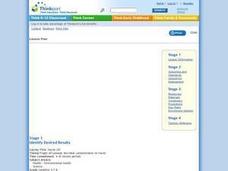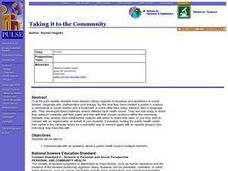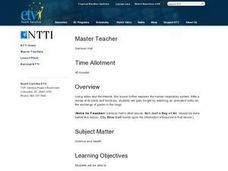Curated OER
Hypothermia on the High Seas
Learners identify and present the effects on humans when the body temperature falls, demonstrate and explain how the body loses heat, and understand hypothermia and cold water survival techniques.
Curated OER
Interpreting Medical Data
Students explore human anatomy by graphing scientific data. In this vision lesson plan, students discuss how ophthalmology works and take their own eye assessment test using the Snellen chart. Students collect vision data from all of...
Curated OER
The Chemistry of Lead
Learners explore the basic concept of physical and chemical properties of the element lead, as well as its historical and modern day uses, and how and why it is toxic to the human body. They are shown the basic reactions of the element...
Curated OER
Hands Off
Students perform a handwashing experiment to see if a difference can be detected in the number and types of microbes on our hands after various types of cleaning. They will also demonstrate that they have learned the whys and hows of...
Curated OER
How Alzheimer's Affects the Brain
Students study how Alzheimer's affects different parts of the brain, sketch a healthy neuron and its parts, and diagram brain changes during the early and late stages of Alzheimer's.
Curated OER
Anthrax Attacks
Students develop an understanding about the disease Anthrax, how it is transmitted, and its effects on the body. By the end of the instructional activity, students have gained the knowledge that bacterial diseases may invade and damage...
Curated OER
Genetic Research and Liberties
Students examine civil liberties issues in relation to genetic research, and discuss how genetic medical information may be used. They present personal viewpoints about genetic research as it relates to civil liberties
Curated OER
Taking it to the Community
High schoolers communicate with an audience about a public health issue in multiple manners. They share their outreach materials with their peers and their chosen audience within the community.
Curated OER
The Meaning of Genetic Variation
Students investigate variation in the beta globin gene by identifying base changes that do and do not alter function, and by using several Internet-based resources to consider the significance in different environments of the base...
Curated OER
Hazard Mitigation: Bioterrorism
Learners discuss different ways to spread infectious diseases. In this bioterrorism lesson, students model the rate of smoke emission using CalRoad software. They analyze the effects of airborne release of biological...
Curated OER
The Allergy Chronicles
Pupils discuss their preconceived ideas about allergic reactions. They assume the role of health writers preparing a special section for the school newspaper on allergies. They research information about allergies and discuss their...
Curated OER
Live Well Now to Live Longer Later
Ninth graders select a topic to research, completing the sentence, "Are the effects of _______ really that detrimental to one's health?" They record information in a journal, including sources of information. Students work in groups with...
Curated OER
Presenting Ecology through Rodent Control
Students role play the member of a health department task force. In groups, they develop their own recommendations to control the rodent problem in the area. They email their local government official and research information about the...
Curated OER
CO2 Blow Out!
Fifth graders determine that carbon dioxide is a gas given off during respiration and that oxygent is the gas that is absorbed during respiration. They determine the air capacity of the lungs.
Cornell University
Vitamin C Module
Test the levels of vitamin C in different juices. After a lesson plan on the importance of vitamin C in our diets, learners use titration to determine the vitamin C content in juice. They use their experience with the titration to study...
Curated OER
The Potential Consequences of Climate Variability and Change
Learners analyze the impact of climate variability and change utilizing a broad span of topics over a wide range of grade levels. This three lesson unit is easily adapted for the various instructional levels listed.
National Center for Case Study Teaching in Science
A Case Study of Memory Loss in Mice
Using a short news article, high school or college biologists examine the scientific method in practice. The article, which focuses on an Alzheimer's experiment performed on rats, has very limited information, so learners must be able to...
Curated OER
What Is El Niño?
Students access information at remote sites using telecommunications, identify impacts by reviewing past El Ni??o events, make and use scale drawings, maps, and maps symbols to find locations and describe relationships.
Curated OER
Sun and Skin
High schoolers work in small groups researching different aspects of the sun and skin. The groups summarize and answer questions about the material in a presentation to the class.
Curated OER
Acids and Bases: Together again!
Young scholars identify principles behind acid-base reactions. They predict factors that may affect an acid-base reaction. Students identify questions and concepts that guide scientific investigations.
Curated OER
Testing for Life’s Molecules
Want to hear a joke about sodium? Na. Young scientists test various materials to identify if they include protein, starch, and glucose by using the Biuret test, iodine starch test, and Benedict's test respectively. After practicing with...
National Wildlife Federation
Ghost Town
Around 93 percent of the reefs on Australia's Great Barrier Reef have been bleached, and almost one quarter of them are now dead. Scholars research the sea temperatures, especially around the areas with coral reefs, to make connections...
National Academy of Sciences
Genetic Disease: Putting DNA to Work
Scientific knowledge of genetic information has grown quickly over the last decade. An interactive lesson has learners research the role of science and medicine in diagnosing and treating genetic disorders. They consider the job of the...
National Center for Case Study Teaching in Science
Bad Blood
When it comes to science and medicine, ethics should always be a primary consideration; unfortunately, that has not always been the case. There are countless examples throughout history of questionable medical practices, marginalized...

























